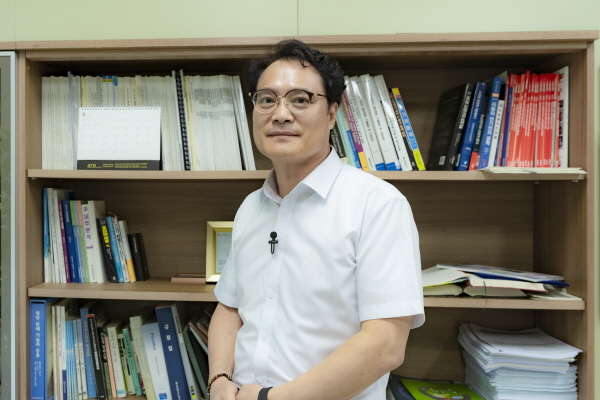본지는 김상호 충남테크노파크 이차전지기술센터 센터장을 만나 센터의 역할, 진행 중인 사업과 현장의 목소리에 대해 들어보았다.
“충청 이차전지 中企 지원 최선 다할 것”
‘이차전지 핵심 소재·부품 양산성 검증 플랫폼 구축’ 수주
충남TP·충북TP·KTL 간 기관 협력 지원 통해 전후방 연계
[편집자주] 충청남도는 현대자동차의 전기차 공장과 더불어 삼성SDI, SK ON 등 대형 배터리 제조사들이 위치한 전기차의 요충지다. 위 기업들과 거래하고 있는 이차전지 관련 소재, 부품 중소기업들을 기반으로 하는 생태계가 조성되어 있는 충남은 도내 이차전지 산업의 성장 지속 가능성이 크다고 평가받는다. 반면, 전망이 밝은 충남의 배터리 산업이지만 인력난을 피할 수는 없었다. 지방이라는 지역적 한계와 더불어 대기업의 자본을 넘어서기는 힘든 모양새다. 충남테크노파크 이자천지기술센터는 충남 소재 기업들의 고충을 해결하고, 기술 개발의 어려움을 해소하기 위해 다양한 사업을 진행하고 있다. 본지는 김상호 충남테크노파크 이차전지기술센터 센터장을 만나 센터의 역할, 진행 중인 사업과 현장의 목소리에 대해 들어봤다.

▲김상호 충남테크노파크 이차전지기술센터 센터장
■ 충남TP의 이차전지기술센터에 대한 소개와 역할에 대해 말씀 부탁드린다
충남테크노파크 이차전지기술센터의 역할은 현재 지역에 있는 중소기업들을 지원하는 데에 주 목적이 있다.
전지제조사인 SK ON, 삼성SDI, 솔라엣지테크놀로지스코리아, 유미코아, 엔켐, 솔브레인 등 중견기업들이 충청권에 상주하고 있다.
이러한 기업들과 연계한 인근 중소기업들을 네트워킹하여 소재, 부품, 장비 기업들이 성장할 수 있도록 지원하고 있다.
특히 소재, 장비 업체들을 중심으로 많은 기업들이 성장하고 있는 것이 보이고 있다.
기업 생태계가 대기업 중심이기에 소기업들의 성장성이 늦춰지고 대기업들은 빠른 성장을 거듭하고 있고, 중소기업은 더딘 경향이 있다.
이러한 부분들을 지원을 해보고자 소형 셀 라인의 실제 소재에 대한 테스트, 충북테크노파크를 통한 중대형 셀 라인의 테스트 등 양 테크노파크가 연계해 진행하고 있다.
충남테크노파크는 2013년부터 ‘수요연계형 리튬이온전지 부품, 소재 국산화 및 고급기반 구축 사업’을 시작했다.
이때부터 이차전지 셀 제조 라인을 설립해서 중소기업에게 셀 라인 제작하는 부분을 진행하고 있고, 2021년도에 BMS관 구축을 완료해서 BMS 관련 사업들을 진행해왔다.
이를 기반으로 현재 이차전지 산업에 관련되는 핵심 역량 강화와 기술경쟁력 확보를 위해 노력하고 있다.
■ 차세대 이차전지 소재부품 산업 육성 클러스터 사업 등 다양한 사업을 담당하고 있는데, 진행상황은 어떠한가
충남에는 이차전지 관련 기업들이 많이 상주를 하고 있고, 전후방 연관 기업들이 사업을 하고 있다.
여기에 따른 정부지원사업을 수주해 클러스터 사업뿐만 아니라 유관기관과 협력해서 이차전지 중소, 중견기업 지원 체계를 구축하고, 2022년부터는 충남 지역에 있는 연구회, 간담회, 기술 교류회 등을 통해서 기업들과 네트워킹을 하고 있다.
또한 기업들과 사업화에 대한 판로 개척, 혹은 조기 사업 발굴 등을 통해 글로벌 강소기업으로 성장할 수 있도록 노력하고 있다.
지속적으로 저희들은 올해 산업통상자원부 주관 ‘이차전지 핵심 소재, 부품 양산성 검증 플랫폼 구축’ 사업을 수주했다.
본 사업은 3년 동안 추진되며, 충남테크노파크가 주관 기관으로 참여하고 충북테크노파크, 한국산업기술시험원, 한국전자기술연구원, 천안과학산업진흥원 등이 참여하여 이차전지 중소형 셀의 양산성 검증을 위해서 전주기 플랫폼을 구축하는 사업이다.
충청권에 있는 이차전지 양산, 공정, 데이터 기반 사업성, 검증, 이차전지 양산형 시제품 제작 지원, 시험 평가, 인증 지원, 전문 인력 양성까지 지원하고 있다.
현재까지 수혜기업을 모집 중에 있으며, 모집이 되는대로 참여기관과 연계해서 기업을 지원할 예정에 있다.
충남테크노파크는 한국산업기술시험원 간의 기관 협력 지원 사업을 통해서 이차전지 관련 기업들에게 전후방 사업을 연계하고, 기술 업데이트를 하기 위한 기술교류회, 세미나도 공동으로 주최하고 있다.
이런 사업들을 통해 기업들이 소재 개발부터 셀을 만드는 양산 라인까지 갈 수 있는 능력을 확보하고 자신들의 소재에 대한 데이터 분석이 있어야 하는데 지금까지 그런 일을 만들어 내는 곳도, 지원해주는 기관도 없었다.
충남테크노파크는 충청권에 있는 이차전지 소재 기업들을 우선적으로 지원을 함으로 해서 기업들이 성장을 하는 데 도움을 주고자 한다.
■ 다양한 기업들이 충남TP에 입주해 있는 만큼 현장의 목소리도 많이 들으실 것으로 생각된다. 기업들이 이야기하는 고충들은 어떤 것들이 있는지와 이차전지기술센터는 이를 덜어내기 위해 어떤 노력을 하고 있는지 궁금하다
기업들을 방문해서 대표님들과 이야기를 많이 나누다보면 80~90%가 인력 문제다.
충남지역도 지방이기 때문에 수도권에 비해서 고급 인력들이 많이 없고, 확보하는 데 어려움을 겪고 있다.
특히 중소기업들이 2~3년 이상 훈련을 시키면 대기업으로 빠져나가는 부분도 있고, 중소기업에서는 전반적인 이차전지 교육을 시키지 못하고 있다.
특화된 분야, 단적인 분야, 자신이 맡은 분야만 교육을 하기에 전체적인 흐름을 모르다보니 그곳에서 오는 오해도 있을 수 있기 때문에 그런 부분들을 해결하려 충남테크노파크와 충북테크노파크가 힘을 합쳤다.
충남테크노파크는 소형 셀을 위주로, 충북테크노파크는 중대형 셀을 담당해서 소형 셀을 만들어보고 중대형 셀로 넘어갈 수 있도록 하고 있다.
소재 기업들 경우는 요즘 소재 비용이 굉장히 비싸지고 있다.
중대형으로 사업을 하기 전에 비용절감 차원에서 소형 셀을 만들어서 양산성이 나오는지 확인을 해볼 필요도 있을 것이다.
인력양성 사업에서 충남테크노파크는 실습 교육을 하려고 한다.
충북테크노파크도 중대형 셀 라인을 구축하고, 충남테크노파크도 소형 셀 라인을 구축하기 때문에 양쪽을 방문해서 실습 교육을 받으실 수 있다.
양산 라인이 돌아갈 경우에는 실습이 안되기 때문에 AI, VR을 통해서 간접적인 테스트를 받을 수 있도록 프로그램을 만들어 나가고 있다.
■ 8월 29일 정부에서 발표한 로드맵 상 이차전지 관련 계획에 대해 어떻게 생각하나
이차전지 예산은 항상 어느 정도 증액도 되고 있고, 이차전지 산업이 성장하고 있는 것은 확실해 보인다.
국내 기업들이 투자하는 부분도 많이 늘어나고, 글로벌 시장에서 그만한 GE 향상이 되기 때문에 기대도 클 것이라 본다.
최근에 첨단산업 전략 산업으로 이차전지가 앞장서서 나가고 있고 또한, 기업의 활동도 지역 경제 활성화를 시킬 수 있는 충분한 역할이 된다고 생각한다.
원자재 수급, 생산시설, 노동력 등 지역 사회에 대한 긍정적인 영향을 줄 수 있을 것 같다.
■ 공급망, 규제 등 변화에 상당히 민감한 산업 분야이기도 한데, 기관과 기업들이 취해야 할 전략에는 어떤 것들이 있나
이차전지 같은 경우는 소재, 부품도 마찬가지 60~70%가 해외 수입에 의존을 하다보니 아직 소재를 완벽하게 국산화하기는 굉장히 힘들다.
가격 문제, 안정성과 관련된 개발 등이 항상 이슈가 되고 있는 부분도 있다.
그러한 것들을 글로벌하게 공급망을 다양한 루트로 구축을 해서 생산 중단 또는 공급 위험을 초래하는 것들을 최소화하는 것이 중요하다.
이 부분들은 국내외 정책적인 부분들을 포함하여, 코로나 사태와 같이 국가 간 단절이 되었을 때 자급적으로 만들어 나갈 수 있는 부분들을 갖고 있어야 한다.
현재 정부에서 하고 있는 규제, 정책 변화 등이 바뀌어야 하고, 정보에 대한 교류가 많이 활성화되어 정책 제언에도 많은 참여가 필요하다.
■ 이차전지기술센터 혹은 센터장님의 목표와 함께 e4ds 독자분들께 한 마디 부탁드린다
저희 센터의 목표는 1%라도 지역 산업에 도움이 되는 역할을 할 수 있을 것이라 믿고, 중소기업들이 성장을 하는 데 역할을 할 것이다.
열심히 할 수 있도록 노력하겠다. 같이 성장했으면 좋겠다.
감사합니다.